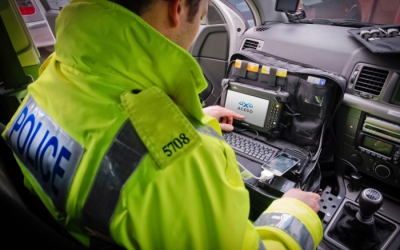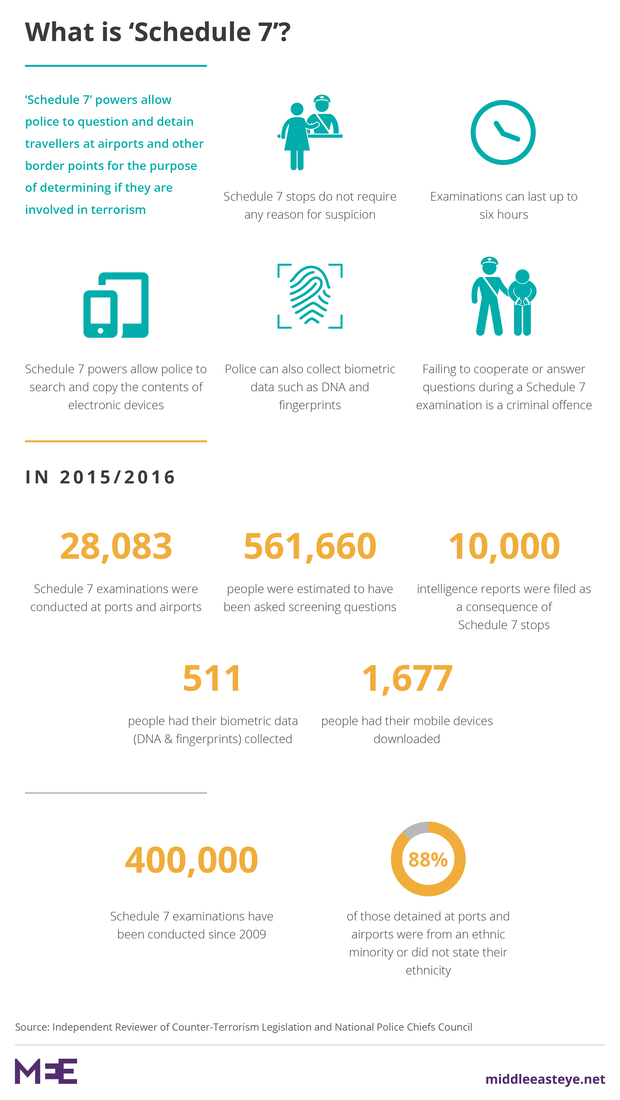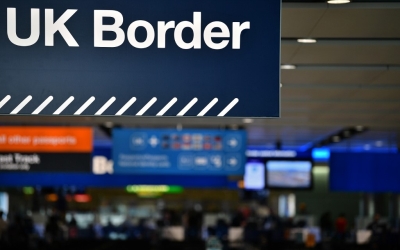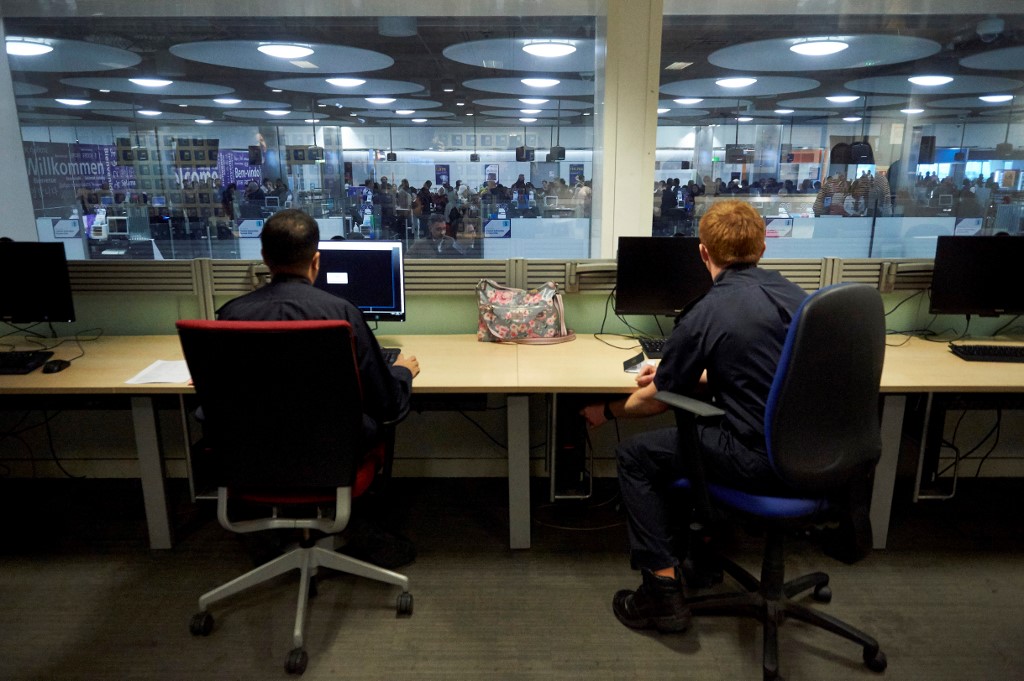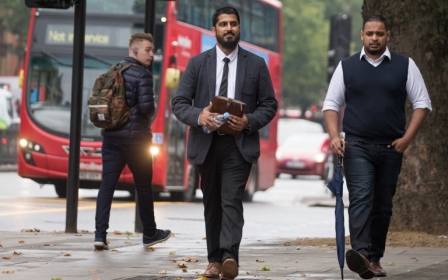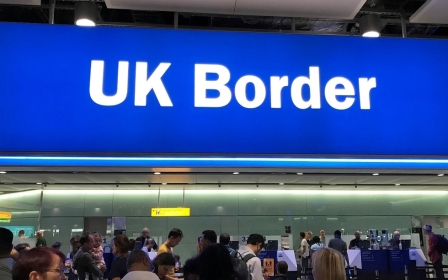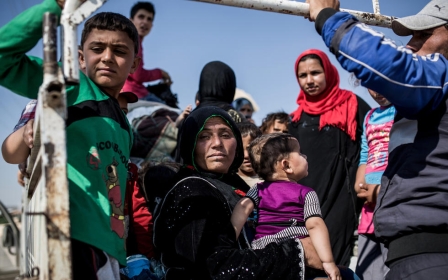'He looks like Bin Laden': Ex-cop accuses UK police of racism over airport stops
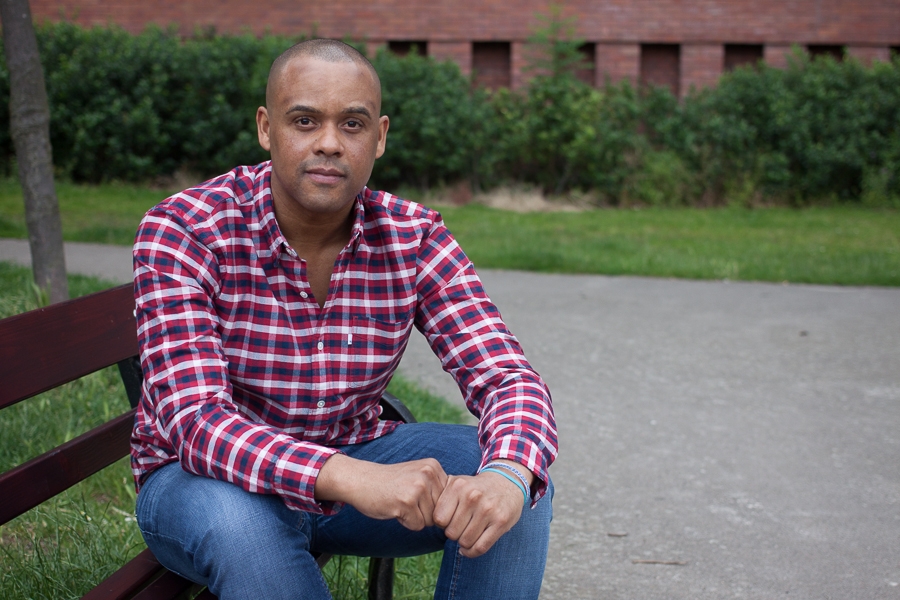
British police “deliberately” targeted Black and Asian airport passengers for questioning based on their race and perceived religion using powerful stop-and-search powers, a former counter-terrorism police officer has told Middle East Eye.
Kevin Maxwell, a former detective inspector at SO15, the special operations unit within the Metropolitan Police responsible for counterterrorism across Britain, said that casual Islamophobia had taken root in the unit to the extent that it may have influenced how passengers were screened.
Maxwell further said that a colleague had once claimed to have stopped a man because “he looks like Osama bin Laden".
Speaking shortly after the release of a memoir of his 11 years in the police, Maxwell told MEE: “We know racial discrimination is a real thing in the police.
“We know it happens. So why wouldn’t it happen in every department of the police, including counterterrorism?”
Maxwell, who left the force in 2012, said that his unit had been incentivised to make stops that were often discriminatory and that in order to meet targets they regularly cooked up the numbers of those stopped using personal information gleaned from passenger landing cards.
His intervention comes a couple months after the Metropolitan Police conceded that it had breached the human rights of a woman who was coerced by officers to take off her hijab, and paid thousands of pounds in damages in an out-of-court settlement.
The woman, known as Asiyah, was stopped on her way through Heathrow two years ago where officers demanded she remove her hijab for identification purposes, or otherwise face arrest.
Asiyah said afterwards she “felt my dignity had been taken away and I had been stripped”, likening the instruction to “two men telling a woman to remove her top”.
Police had invoked a powerful counterterrorism law which is used to stop thousands passing through the UK’s ports and airports every year.
Under Schedule 7, officers can detain and question individuals without grounds if they suspect they are involved in terrorism.
Refusing to comply is a crime and those stopped must hand over their computers, passwords and phones if requested, and give fingerprints and DNA, in a process described by campaigners as a "digital strip search".
Maxwell’s insider’s account offers a rare glimpse into the day-to-day reality of how the power is used. It reveals in detail how police appear to be using Schedule 7 to disproportionately target minorities and will renew questions about whether the power is lawful.
Racial prejudice
A former detective inspector, Maxwell won a high-profile tribunal case in 2013 which found the Metropolitan Police had hounded him out through racial and homophobic harassment.
Maxwell had worked between 2008 and 2012 within SO15, based at Heathrow, the UK’s busiest airport through which more than 70 million passengers pass each year.
His testimony of his time in counterterrorism - published in his memoir Forced Out - is one of the first sustained accounts of life on the frontline of police counterterrorism operations in the UK.
Maxwell emphasises that as a policeman it has never been his place to criticise any law, Schedule 7 included. “My argument is not: this works, that doesn’t work. I’m talking about the impact of racial prejudice and racism on these policies,” he told MEE.
But he is explicit that how it is used unfairly targets minorities.
A Home Office code tells officers that when using Schedule 7 they must not discriminate based on race, religion, gender, age or sexual orientation. Maxwell says this happens all the time. Describing the stopping regime at Heathrow, he writes: “Black and Asian people were deliberately targeted on grounds of their race and colour.”
He says religion was used, too. According to Maxwell one man was stopped, he was told by a colleague involved in the stop, because “he looks like Osama bin Laden”. The officer said it “as a joke” but “There was nothing my colleague said in terms of, he acted suspiciously, he did anything which gave us cause for concern.”
Data shows that the vast majority of those stopped under Schedule 7 are ethnic minorities. There is no public data on the religious identities of those stopped, but many are thought to be Muslim.
Maxwell said he witnessed casual Islamophobia in the counterterrorism police, and that this could feed into how passengers were screened. At an Islamic awareness day at a mosque, arranged by bosses who were concerned the unit was not building bridges with the community, he says one colleague refused to eat the food because “they will have spat in it”.
Others complained about attending because imams were doing “nothing” to stop terrorism. Another officer refused to take off her shoes, saying it was not her religion or rules. Maxwell says he was told not to socialise with Heathrow’s Asian workers because they “might have links to terrorism”.
When it was conceived as part of the Terrorism Act 2000, Schedule 7 was not intended to be used at random, so it is not surprising that certain groups are affected more than others.
Home Office rules say that when choosing people to stop, police can take into account “any information on the origins and/or location of terrorist groups” and “possible current, emerging and future terrorist activity”.
But according to Maxwell’s account, police go further than this and treat certain ethnic, religious or national groups as inherently suspect. When he was working, around three quarters of terror threats to the UK were thought to originate in Pakistan.
He alleges that “the police was blind to the fact that, although many suspected of terrorism came from Pakistan, not every Pakistani person was a terrorist”.
“You will get some officers who will target on the basis of race and the flight [the individual’s] just come from, because that’s the way he or she’s wired,” he says.
Performance targets
As well as the prejudices of individual officers, Maxwell pointed to a systemic problem in the police. He described how performance targets, pinned on office walls or available on the police computer system, incentivised officers to make stops they otherwise would not, more often than not on minorities.
“If officers are on a normal patrol shift and you tell them you’ve got to do 10 stop searches, of course, who are they going to target?” he said. He says he was given a target of at least two stops per shift.
One controversy around Schedule 7 is that few stops appear to lead to convictions. The British government does not publish this data, making informed debate impossible.
A Home Office source told MEE that between 2015 and halfway through 2018, Schedule 7 stops had helped in 30 percent of cases in which a suspect was charged under the Terrorism Act 2000.
'The police was blind to the fact that, although many suspected of terrorism came from Pakistan, not every Pakistani person was a terrorist'
- Kevin Maxwell
But last year the campaigning group Cage claimed that of more than 400,000 Schedule 7 stops it had studied since 2009, just 30 resulted in a conviction.
Maxwell offered an explanation for the tiny number. “In order to keep up their stop figures, my colleagues would attend the immigration desks, mainly when they were unstaffed, and take a handful of landing cards that had been filled in by passengers who had long gone,” he writes.
“They would sift through the cards, looking for what they considered non-white names. These passengers would then be processed, using the information on the cards, and put onto a police database as if they had been stopped.”
'Planned targeting'
Maxwell did not blame officers for this. “It could be a really quiet day,” he said, adding: “I don’t think any police officer wants targets.” But he said it can build resentment among the groups affected.
“You’re potentially putting someone on the system who shouldn’t be, and then when he or she next goes through, or is stopped on the street, they could be on a terrorism system,” he said. “They’ll say they didn’t speak to anyone. The officer might be thinking they’re lying.”
Maxwell described officers at Heathrow spending "much of the day sitting about talking, reading the newspapers and so forth".
“Towards the end of the shift, my colleagues would go out and find their targets to put in the two stops required.” He said “planned targeting” would be announced in the office. “As long as management saw that we had two stops that day, we’d played our part in keeping Britain safe”.
According to Maxwell, the use of Schedule 7 was not all arbitrary, with some stops “intelligence-led” and some made by officers using their experience to “identify suspicions”.
Richard Smith, the current head of SO15 who was appointed last year, takes a different view. He told MEE: “Individuals are not stopped by police because of their culture, faith, race or religion.”
He said stops are made “only if deemed appropriate and necessary by the officers”, and every allegation of an abuse of power is “thoroughly investigated and appropriate action taken”.
'The importance of Schedule 7 is real and its use cannot be underestimated'
- Richard Smith, head of SO15
He added that there were no performance targets “in terms of numbers of stops carried out”, raising the possibility that the practice has stopped since Maxwell’s time.
“The importance of Schedule 7 is real and its use cannot be underestimated,” Smith said.
“It has enabled us to foil the plans of a woman who was planning an attack in the UK, stopped people bringing proscribed items into the country, prevented people from delivering money intended to fund terrorism overseas, and prevented people going abroad to join terrorist groups, to name but a few instances.”
A number of changes have been made to the Schedule 7 procedures since Maxwell left the police. For instance, those detained for questioning can only be held for six hours and detainees are now entitled to the same legal rights, such as access to a lawyer, as those detained in a police station.
The number of stops have declined dramatically - by about 80 percent, with 9,540 last year - suggesting Schedule 7 is being used more selectively. The Home Office says controversy about the law “may have driven a more targeted approach in its use”.
Campaigners point out that the official data does not include those subjected to initial “screening” questions for which figures are not available.
It has also been suggested that the decline indicates the power was never as useful as made out to be, though Maxwell said it was undoubtedly part of the “toolkit” used all the time by police.
A Home Office spokesperson said: “The government’s priority is the safety and security of the UK, and the use of Schedule 7 powers is a vital tool for the police.
“The decision to examine an individual’s use of Schedule 7 would be taken independently by police, and arbitrary or discriminatory use of the powers is prohibited.”
But the UK’s independent reviewer of counterterrorism legislation, who acts as a watchdog, says there remains a risk those stopped are being subjected to “unfair discrimination”, by officers selecting “intuitively”.
Jonathan Hall QC notes that there has been a sharp drop in the proportion of Asian-appearance people charged and convicted for terrorism offences, but little decrease in the proportion who are stopped under Schedule 7.
'I joined counterterrorism to stop terrorists terrorising my country. But my concern has always been that if we don’t do it properly it undermines the whole system.'
- Kevin Maxwell
Maxwell’s evidence will add weight to existing concerns that Schedule 7 is unlawful. Last year the European Court of Human Rights ruled that the detention of a French woman under the law in 2011 had violated her right to privacy and family life.
For Maxwell, counterterrorism that discriminates is not just unfair, it is “self-defeating”.
“I joined counterterrorism to stop terrorists terrorising my country,” he said. “But my concern has always been that if we don’t do it properly it undermines the whole system.”
“Look at 7/7,” he added, referring to the 2005 bombings on the London transport network which killed 52 people and the four attackers.
“What makes four young Brits want to cause harm to their own country? I get that radicalisation will play a part. But I wonder how much of a part their interactions with authorities will play.”
Middle East Eye delivers independent and unrivalled coverage and analysis of the Middle East, North Africa and beyond. To learn more about republishing this content and the associated fees, please fill out this form. More about MEE can be found here.


